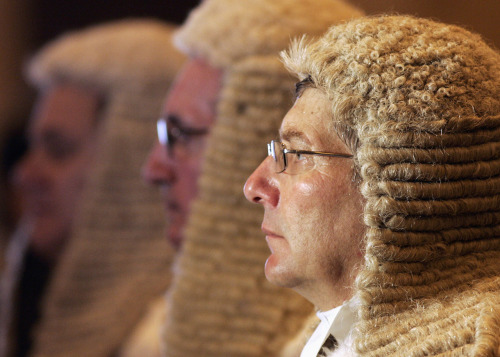
[Image: Reuters]
Posted by "Sayf Maslul"
In the Anglo-American common law system, lawyers are encouraged to obfuscate the truth and use sophistry to besmirch the integrity of honest witnesses. In the U.S., it is estimated that upwards of four percent of the prison population is innocent (a staggering 80,000 people, more than double the prison population of Canada) — with some on death row — but more than half of guilty defendants get off.
Chronology is always the first element of deduction, so perhaps an evaluation of the development of the Anglo-American legal system is in order. The following account, drawn largely from the words of more than 300 lawyers and judges over the past few millenia, suggests that the system developed in what we might classify as six stages.
1. Trickle-Down Extortion: English common law began in 1166. At the time, every public office was for sale; buyers in turn extorted bribes from people who dealt with the office. It seems fair to assume that judges used lawyers as go-betweens for extortions. The entire form of the law, then, evolved from an elaborate dance of bribery and manipulation; hardly a solid foundation upon which to build a society.
2. The Cartel: Members of any cartel collude to increase prices and profits. As Judge Richard Posner of the U.S. Court of Appeals has said, judges and lawyers have always been a cartel. That may explain why judges have never been trained as judges; one day they are lawyers versed in sophistry -- trick questions, false arguments, etc. -- and, after either an election or political appointment, judges the next. Hence the uneasy feeling: will a ruling reflect justice, or will it be made for some other purpose? Political ideology? More business for lawyers? Power?
3. Truth Rejected: Justice Russell Fox, who researched the law for 11 years after he retired from the Australian Federal Court, said that justice means fairness; fairness and morality require a search for the truth; truth means reality. Judges in England rejected a truth-seeking (inquisitorial) system in 1219. That partly explains why our system can at its worst be unfair, unjust, unreal, and immoral; truth often takes a back seat to process and form.
Continental European countries adopted an inquisitorial system after a church-state conference in November 1215, but of course their judges perverted justice in a different way; for more than five centuries, they believed torture to be a reliable method of finding the truth.
4. The Civil Adversary System: The system dates back to 1460, when judges began to let lawyers take control of pleadings. Comparing Napoleon's reformed inquisitorial system with the adversary system would dismay our taxpayers. In France, trained judges are in charge of evidence and questioning witnesses. Paid on a fixed wage, they have little motive to prolong the process. Most hearings take a day or so.
In our system, lawyers control evidence and question witnesses. At $300-plus an hour, they have an incentive to spin the process out. The hearings process can take months or years. Untrained judges do the decent thing: they try to stay awake, often successfully. Yale law professor Fred Rodell said the system is "nothing but a high-class racket".
5. The Criminal Adversary System: Lawyers did not defend criminals for more than five centuries: there was no money in it. It was not until the 18th century that they began to do criminal work, and naturally took over the process.
Unfortunately for lawyers, the common law still had few tools they could use to circumvent the truth. With conviction fairly certain, the accused might be reluctant to pay for legal services, choosing instead to keep their money for when they got out. Happily, the rights of the accused were suddenly discovered.
6. Concealing Evidence: Over the last 200 years, judges have invented myriad truth-defeating devices, including a few that conceal important evidence. Here are a few:
The "Right" Of Silence: The rule against self-incrimination is based on a lie by the first legal academic, a charlatan named William Blackstone. It's estimated to get off about a quarter of guilty defendants.
Concealing Context: Serial sex criminals are largely protected by a rule that conceals evidence of a pattern of criminal behavior.
Cross-Examination: Lawyers are allowed to use sophistry to make honest witnesses look unreliable.
Juries: Juries let off about 25 percent of guilty defendants, according to some estimates, because jurors are confused by concepts such as "beyond a reasonable doubt."
In France, evidence is not concealed and lawyers are not allowed to use artful lies to pollute the truth. The innocent are rarely charged; 95 percent of guilty defendants are convicted. Public confidence in the system is high.
In the Anglo-American common law system, lawyers are encouraged to obfuscate the truth and use sophistry to besmirch the integrity of honest witnesses. In the U.S., it is estimated that upwards of four percent of the prison population is innocent (a staggering 80,000 people, more than double the prison population of Canada) -- with some on death row -- but more than half of guilty defendants get off.
Taxpayers Clearly Pay Too Much For Too Little Justice. Changing To A Truth-Seeking System Might Be A Remedy. This would require, at a minimum: outlawing the concealing of evidence; re-training academics to teach law students techniques of finding the truth instead of mugging up a million ways to defeat it; dismantling the professional cartel by training judges separately from lawyers; appointing six times as many judges, on the basis of rigorous examinations, and giving them back control of the process; compelling lawyers and judges to take an oath to tell the truth; having lay jurors and trial and appellate judges sit together to render their verdicts and levy penalties (if any) together.
Justice Russell Fox said the public knows that "justice marches with the truth." It's high time we tried to reunite the two.
Courtesy Of "The Atlantic"




No comments:
Post a Comment